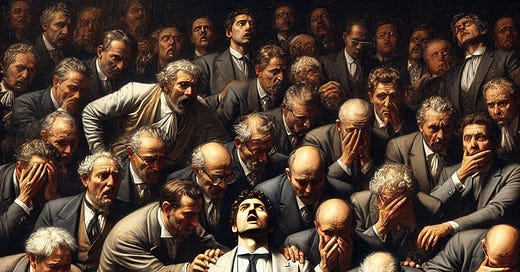Dante's verse "Poca favilla, gran fiamma seconda" (Paradise I, 34) plays on the dual meaning of "favilla" as both flame and word. Throughout the Divine Comedy, Dante employs this metaphor, as with Ulysses, where "faville" represents both the flames enveloping the fraudulent soul and his deceptive words, or with Semiramis, “fu imperadrice di molte favelle", (empress of many tongues/flames).
The metaphor is grounded in the biblical letter of Saint James, comparing the tongue to a small fire capable of igniting an entire forest. This analogy emphasizes the power of speech as humanity's distinctive trait: a tool of free will that can either elevate us or reduce us to beasts.
I hope you enjoy my new short story titled “Poca favilla…”.
The soundtrack is “Power to Love” by Jimi Hendrix.
Happy reading.
In the Italian Parliamentary Hall
The legislative hall in Rome vibrates with tension, a hushed anticipation hanging in the air like thick smoke. Rows of representatives sit in their designated seats, papers scattered, whispers exchanged in furtive glances. The afternoon session drags on, another seemingly endless debate about reforms that promise much but deliver little.
Suddenly, the massive wooden doors explode open. A figure enters—Marcello—his frame trembling with a rage that seems to physically distort the air around him. His eyes burn with an intensity that makes even the most seasoned politicians instinctively lean back.
Marcello: "Poca favilla gran fiamma seconda!"
The words of Dante echo through the hall, a poetic declaration of impending destruction. He repeats them, each time with increasing fervour.
"Poca favilla gran fiamma seconda!"
Like a prophet of ancient times, he moves between the benches. The first slap rings out—sharp, sudden, devastating. Shock paralyzes the room. Parliamentarians, caught between disbelief and terror, remain frozen.
"Poca favilla gran fiamma seconda!" Marcello screams again, his voice a mixture of poetry and pure, unfiltered rage.
Each slap is a judgment, each movement a ritualistic condemnation. The marble floors witness his furious dance of punishment. Some politicians try to shield themselves, others sink deeper into their seats, hoping invisibility might save them.
Now the grotesque performance of remorse begins. Parliamentarians start to weep—not discrete tears, but great heaving sobs that seem almost theatrical. One by one, they begin prostrating themselves, some kissing the floor, others tearing at their expensive suits, creating a tableau of exaggerated contrition.
"We are worthless!" one shouts, ripping his shirt open.
"Forgive us!" another wails, rolling on the ground like a penitent in a medieval passion play.
Some start flagellating themselves with their leather briefcases, each blow accompanied by increasingly dramatic declarations of shame. A senior representative begins to eat pages from the legislative documents, mumbling about consuming their failures.
"Poca favilla gran fiamma seconda!" Marcello continues, the Dantean verse now a rhythmic counterpoint to their grotesque display of remorse.
The politicians lie in various poses of abject submission—some curled in fetal positions, others spread-eagled on the marble floor, hands raised in desperate supplication. Their weeping becomes a chorus of performative anguish, each trying to outdo the other in demonstrating their profound unworthiness.
"Poca favilla gran fiamma seconda!" he repeats, the Dantean verse now a more potent weapon than his hands.
At the chamber's centre, Marcello pauses. His chest heaves. The rage courses through him, a living entity. He surveys the desolation, feeling no remorse, understanding that this moment transcends individual punishment.
Marcello (softly): Too late for words...
With a contemptuous glance that speaks volumes, he turns. The doors close behind him with a finality that feels almost symbolic—the sound of institutional failure, a system collapsing under its moral bankruptcy.
The Italian parliamentary hall remains, a silent witness. The marble walls, the ornate ceiling, the empty benches—all bear testimony to this moment of radical, poetic justice.
Outside, Rome continues. Inside, a revolution has just been performed, not with ballots, but with the raw, unfiltered energy of one man's fury and a centuries-old poetic verse.
Feel free to leave a comment.
I have woven tales for anyone who cares to read them. My books await you on Google Books. Check also my stories on Medium.com.
I am eager to participate in research and produce content on Cross-Cultural Philosophy. Considering the many philosophy professors following Learn Vedanta Substack from universities across the five continents, I would be truly honoured to be involved in projects, as I have been recently approached. Please feel free to contact me.
I would be honoured if you considered subscribing to the Premium Contents of my Vedanta Substack and leaving feedback, comments, and suggestions on this page and by writing to me at cosmicdancerpodcast@gmail.com.
Visit my BuyMeACoffee page.
Thanks for reading.




